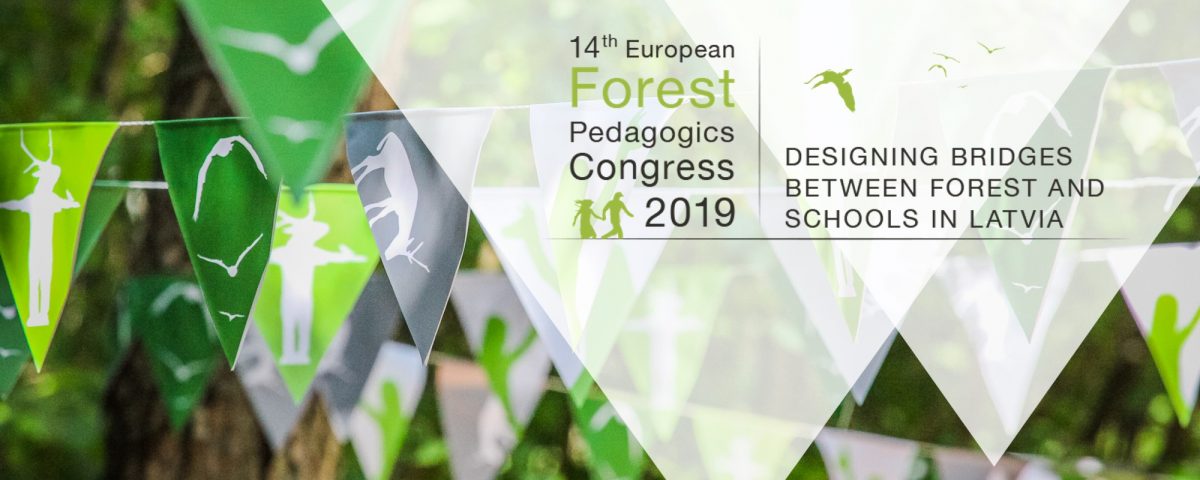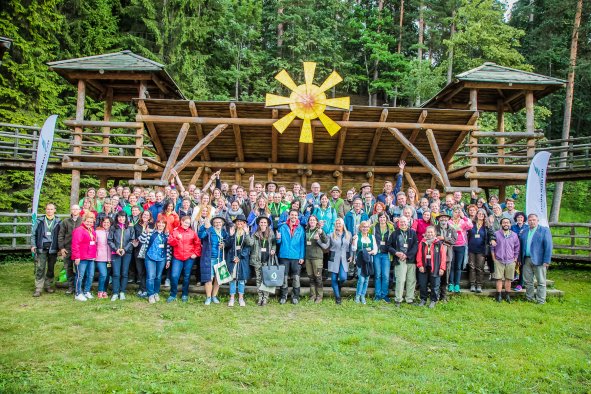14thEuropean Forest Pedagogics Congress in Latvia

European Forest Week 2019
15. July 2019
14 Engaging photos from 14thForest Pedagogics Congress in Latvia
25. July 201914thEuropean Forest Pedagogics Congress in Latvia
Author: Latvia’s State Forests (LVM)
D esigning bridges between forest and schools - this was the motto for the 14th European Forest Pedagogics Congress that took place in Riga and Tērvete from 1 to 4 July, bringing together around 170 educators and foresters from 18 countries around the world. The event was organized by JSC “Latvia’s State Forests” (LVM) in cooperation with international Forest Communicators Network – Subgroup Forest Pedagogics, the National Centre for Education and Riga Technical University (RTU).
The European Forest Pedagogics Congress is an annual forum for participants to exchange ideas and experiences in the field of forest pedagogy. The succession of the congress is provided by the Forest Communicators Network – Subgroup Forest Pedagogics, which is part of the UNECE Timber Committee on Forests and the Forest Industry and FAO European Forestry Commission.
Within the framework of this international congress in Latvia 12-hour further education courses for teachers were also held. This time teachers were especially encouraged to become real-life forest pedagogues continuing the idea of learning "together" that was iniciated a year before in Finland. In total 50 teachers from different schools of Latvia were invited to learn from each other as well as from forest professionals and other congress participants gathered in Riga Technical university. Guntars Catlaks, Head of the National Centre for Education, emphasised at the opening of the congress: “The new national education standard offers enormous opportunities for Latvian teachers to relate learning to real life, and forest is a perfect place to hold top quality learning process where students not only acquire knowledge and skills but also a number of different competences specific and crucial for the 21st century.”
This idea was also supported in the opening speech by Jānis Eglītis, representative of the Ministry of Agriculture of the Republic of Latvia: “Forest occupies more than 52 percent of the territory of Latvia, and it is our responsibility to take care of it. The professional development of teachers is very important in this area, because it contributes to a deeper understanding of sustainable forest management.”
During the congress, teachers at RTU Faculty of Power and Electrical Engineering discussed and listened to lectures on experience of Latvia, Germany and the Czech Republic in forest pedagogy, as well as participated in 11 workshops. These workshops offered them an opportunity to find out how to incorporate forest education in school programmes, how to use geospatial systems in the process of learning about the environment, how to work hand in hand with forest industry experts and teachers, and how to build top quality learning content.
Part of the congress was held in Latvia's State Forests Nature Park in Tērvete, where representatives of the “Skola 2030” project and the association “Green Homes” together with the scholarship contest “LVM Bio-economy School” participants from Jelgava Spīdola State Gymnasium introduced those present with their visions about how schools could build a bridge between forest and education in the future. Participants discussed practices for the implementation of competence education and challenges, such as curriculum planning, time constraints, and student performance assessment.
There were also activities organised by the participants themselves, which allowed them to become students once again and enjoy the learning process in the forest. These activities involved practical tasks, attentive listening and team work. Pigman, the patron of the LVM “Do not Litter the Forest!” campaign, showed forest educators how work with pre-school children is organised in Latvia.
Summarizing the experience gained at the congress, the most important conclusions concerning the development of forest pedagogics in schools were highlighted:
- Young people distancing away from nature is a global problem, as people spend more and more time indoors and in social networks. In general education schools, too, the process of learning about forest takes place mainly in premises, far away from the real forest environment, so it is necessary to promote the study process in nature, to develop competences employing all senses.
- For decades Latvia's State Forests has been offering diverse forest environment education programmes for schools, with around 20 000 participants annually. This is part of diverse forest pedagogics support system for schools provided by many forest related companies and associations across Europe. The education reform in Latvia, as well as in other European countries provides a unique opportunity to improve and integrate the forest pedagocis experience accumulated as a result of the forest sector and school partnership into general schools of Europe.
- As one of the most forested countries of Europe, Latvia has great potential to become a knowledge-based bio-economy country, incorporating forest pedagogy into the general education curriculum and developing students’ transversal competencies, especially entrepreneurship in relation to sustainable forestry and timber industry. Forest pedagogics network can contribute to development of bioeconmics all over Europe building stronger bridges between schools and forest.
At the end of the congress, participants shared their experience. Peter Fischer, representative of the German Forest Protection Association, said: “This was probably the best congress I have ever visited. The fact that there are young people in the organizers' team gives me confidence that this generation will bring forest education to a new level.”
The congress organizers in Latvia are greatful to many supporters: Forest and Wood Products Research and Development Institute “MeKa”, Latvian Forest Research Institute “Silava”, JSC “Latvijas Finieris”, associations “Zaļās mājas” and “Bērnu vides skola”, Interdisciplinary Centre for Educational Innovation at the University of Latvia and project ”Skola2030”. The congress was financially supported by the Latvian Environmental Protection Fund.
Links to:
Key-note speakers and PRESENTATIONS
Workshops
Market of activities
| Country | Participants |
| Austria | 4 |
| Belgium | 1 |
| Bulgaria | 7 |
| Croatia | 6 |
| Czech Republic | 13 |
| Estonia | 3 |
| Finland | 15 |
| Germany | 16 |
| Ireland | 1 |
| Japan | 1 |
| Latvia | 77 |
| Norway | 3 |
| Poland | 4 |
| Slovakia | 8 |
| Slovenia | 2 |
| Switzerland | 2 |
| United Kingdom | 2 |


